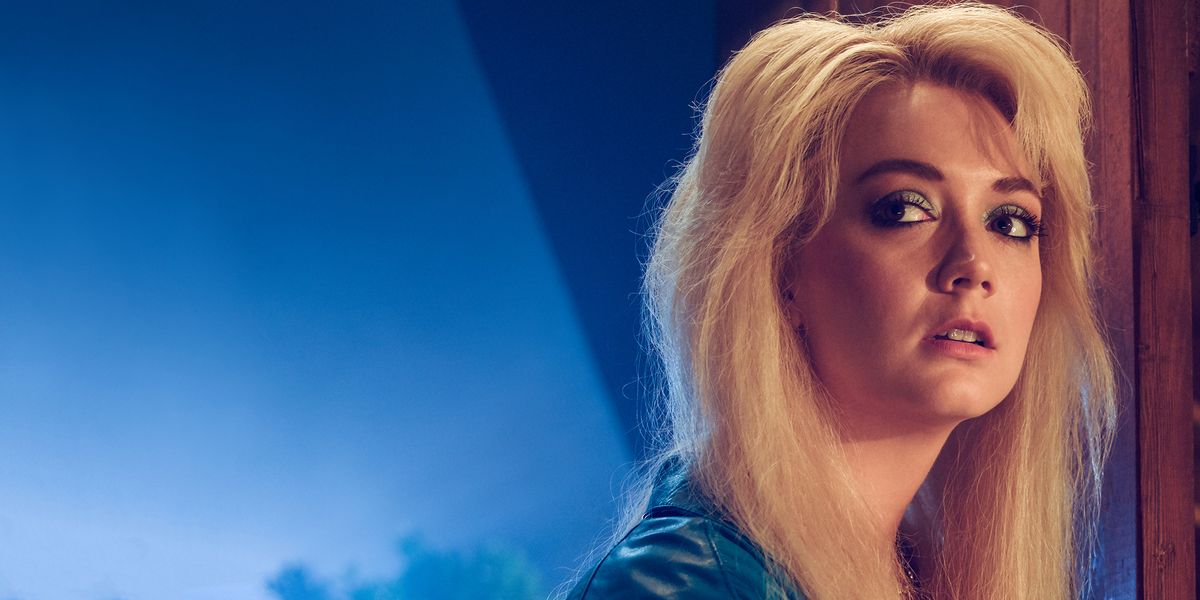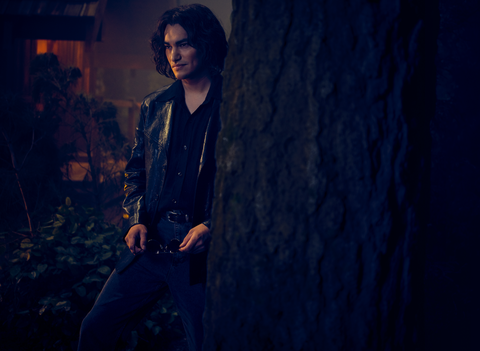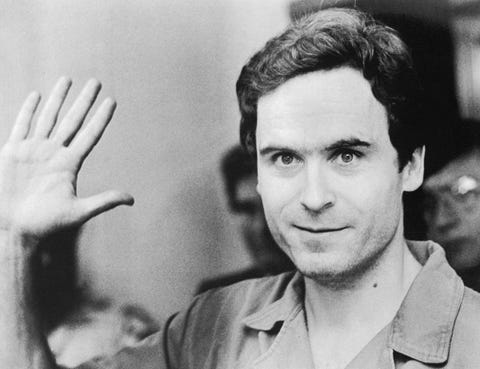American Horror Story returned for its ninth season last month with a whole new cast of characters for us to get emotionally attached to before they’re gradually massacred. Titled 1984 (which is not a George Orwell reference, sorry to this man), the season introduces AHS mainstay Emma Roberts as Brooke Thompson, a virginal teenager who makes the dubious decision to head out into the woods with a bunch of strangers to attend a not-very-legit-seeming summer camp. In fairness to her, she only goes with the gang after a serial killer breaks into her Los Angeles apartment and attacks her, which is as good a reason as any to get out of the city!
There were surprisingly few references to previous AHS seasons in the 1984 season premiere, especially compared to last year’s Apocalypse, which was basically a smorgasbord of easter eggs for devoted fans. But though 1984 may be turning over a new leaf, there are still plenty of pop culture references to unpack. Here’s a roundup of key references in the show so far.
Richard Ramirez, aka “The Night Stalker”
The first—and so far, the only—clear reference to previous AHS seasons comes when Brooke is attacked in her apartment by a man named Richard Ramirez (Zach Villa). “You’re going to be famous,” he tells her, right before running away. “You’re going to die by the hands of the Night Stalker. I will find you. Satan will show me the way!” He later reappears to stalk her at Camp Redwood, because he takes his title seriously.
As any true crime fan worth their salt will know, Ramirez was a real serial killer (and a real Satanist) who terrorized California residents between 1984 and 1985, and was dubbed “the Night Stalker” by the media. But this is also a callback to American Horror Story‘s fifth season, Hotel, in which the ghost of Ramirez made an appearance at Devil’s Night, having been invited there, along with several other late serial killers, by James March (Evan Peters).
And the rabbit hole goes even deeper: In real life, Ramirez once resided at the Cecil Hotel in Los Angeles, a place with a history so creepy that there’s an entire Wikipedia page dedicated to a “List of Deaths and Violence at the Cecil Hotel.” The Cecil was reportedly the inspiration for AHS: Hotel, so it’s only fitting that Ramirez would make an appearance. And since 1984 starts out in LA and takes place in southern California, more Hotel crossovers could well be coming.
Hawthorne Hospital
This is a blink-and-you’ll-miss-it reference that could also just be a coincidence, except that in the AHS universe, nothing is a coincidence. Camp Redwood’s resident nurse is played by Pose star Angelica Ross, who casually mentions to Brooke and the gang that she works at Hawthorne Hospital. In last year’s Apocalypse, the Hawthorne School for Exceptional Young Men played a major role, providing a safe haven for warlocks. Both locations are in California, so could they be connected?
Friday the 13th (1980)
One of the first things we heard about this season of AHS was that it would be packed to the gills with references to 1980s horror movies, and the premiere did not disappoint. The season’s whole premise is also an homage to Friday the 13th, the 1980 slasher movie in which a group of horny teenage camp counselors are hunted down and gradually murdered by a mysterious killer. Camp Redwood, with its lake, its dense creepy forests, and its dark, violent history, is clearly modeled on the camp at the center of Friday the 13th. 1984 even introduces a creepy local who warns the kids to stay away from the camp, and just like his counterpart in the movie, his very sage advice goes fully ignored. Right off the bat, the blood-red scrawl of the season’s title font (above) is also a shout-out to the Friday the 13th franchise titles.
Halloween (1978)
The central killer in 1984 doesn’t seem to be Ramirez, but Mr. Jingles (John Carroll Lynch), who committed a massacre at Camp Redwood fourteen years ago and has been incarcerated in a psychiatric hospital ever since. The sole survivor of that bloodbath was Margaret (Leslie Grossman), who’s now in charge of the camp. But now Mr. Jingles has escaped, and he intends to finish the job he started. The sequence in which he breaks out of the institution (releasing all of his fellow inmates in the process, because the security protocols at this place seem…lacking) is very reminiscent of the way Michael Myers escaped captivity, more than once, in the Halloween franchise.
The Texas Chainsaw Massacre (1974)
The wise local who tries to in vain to warn the kids about the camp is a gas station attendant, which is a reference to a classic scene from Texas Chainsaw Massacre. In the latter, the movie’s doomed lead characters stop to get gas, only to be told that the pumps are all empty. The attendant then warns them not to go messing around in old houses, and tells them “you don’t want to go foolin’ around other folks’ property. Some folks don’t like it, and they don’t mind showing ya.” Suffice it to say they probably should’ve listened to him.
Ghostbusters (1984)
The only prominent pop culture reference in episode two came during Margaret’s (Leslie Grossman) conversation with the mysterious Jonas, who is revealed to be the ghost of a camp counselor who was murdered on the night of the 1970 massacre. Jonas is just as confused about his whole deal as the rest of us. He’s been trapped in a purgatory of reliving that night for the past fourteen years, and at one point, he asks Margaret if he’s a ghost. Her response: “Who am I, Dan Aykroyd?” This is of course a reference to Ghostbusters, one of the most iconic movies of ’84, in which Aykroyd played Dr. Raymond Stantz (and also co-wrote the screenplay). I’ll just be out here crossing my fingers for a Stay Puft Marshmallow Man cameo down the line.
And in episode five, Ghostbusters got a second shout-out. After Montana casually murders a cop, she pretends to be possessed by creepily uttering the phrase: “There is no Montana, only Zuul.” This is, of course, a reference to Sigourney Weaver’s Ghostbusters heroine Dana, who actually did get possessed.
The Apocalypse gas station
All credit here goes to eagle-eyed Twitter user Zowie Schickram, who clocked this incredibly subtle reference to past AHS canon. As Schickram points out, the gas station featured in 1984 appears to be exactly the same one that appeared in last year’s AHS: Apocalypse, which is interesting because that season took place in the future, while 1984 takes place in, well, the year 1984.
Given that 1984 has been unusually light on references to AHS history, this is a pretty exciting discovery. Does it mean anything? Only time will tell.
Ted Bundy
As of episode three, Richard Ramirez is no longer the only real-life serial killer getting airtime in 1984! During the delightful sequence in which it’s revealed that Nurse Rita (Angelica Ross) is not a nurse at all, but a twisted psychologist who masterminded Mr. Jingles’ escape from the hospital, she explains her puritanical philosophy about what drives men to kill. “If you ask me, all those murders are because of all the pornography and objectification of women in our culture,” she says, and follows it up with this kicker: “That’s what Ted Bundy said.” Rita’s just out here quoting Ted Bundy like he’s the Dalai Lama, which seems…terrifying. She also had a very rational and logical explanation for breaking Jingles out of jail: She wants to study him in his natural habitat! All in all, nothing but good choices being made by Rita, whose actual name is Donna. Yikes all around.
Briarcliff Manor
AHS aired its 100th episode on October 23, and though the episode was disappointingly light on crossovers and homages to previous seasons, there was one major callback to AHS canon. Picking up after a one year time jump, the episode gradually reveals what everybody’s been up to since the second Camp Redwood massacre, which in Margaret’s case is cashing in! She’s established herself as a kind of true crime real estate mogul (not gonna lie, jealous) and has been snapping up every property with a violent past she can get her hands on and turning them into morbid tourist attractions. Among her portfolio are John Wayne Gacy’s house, the Manson family home base at Spahn Ranch, and Briarcliff Manor, the Massachusetts psychiatric hospital that was the central setting of AHS: Asylum. Does this mean more substantial crossovers are on the way later this season?
The return of Lily Rabe and Dylan McDermott
Turns out the answer to the above question was a hearty yes! In the latter half of the season, 1984 is making up for lost time with AHS callbacks by introducing two very familiar faces. In episode seven, “The Lady In White,” Lily Rabe, an AHS mainstay who’s impressively appeared in every single previous season bar one (Cult), shows up to play the eponymous lady, who turns out to be a) Mr. Jingles’s mom, and b) the original Camp Redwood killer!
For most of the season, we’ve been thinking Margaret’s 1970 massacre was the first, but the proud tradition of bloodletting at Camp Redwood actually started 22 years before that, back when it was known as Camp Golden Star. In 1948, Rabe’s cook is driven to madness after her youngest son, Bobby, dies in a swimming accident. She holds everybody at the camp responsible—including her older son, Benjamin, aka Mr. Jingles—and goes on a murderous rampage that’s only cut short when Benji kills her. Considering this horrifying origin story, Mr. Jingles honestly didn’t turn out so bad?
Meanwhile McDermott, known and loved by AHS fans as one half of the ill-fated Murder House couple in the show’s very first season, also showed up in “The Lady in White” as a seemingly harmless dude named Bruce who unsurprisingly turns out to be a serial killer. If I were Brooke and Donna at this point in the narrative, I would not be giving a ride to any type of stranger, much less a mustachioed creep who’s conveniently willing to help them fix their conveniently broken car. Brooke and Donna have evidently learned nothing from their traumatic adventures, and things go south pretty quickly. After Bruce gets into their car, he knocks both women unconscious and gives Brooke an ultimatum: kill Donna, or die herself. Brooke, now a hardened badass having survived her own execution, picks the third option and overpowers Bruce, cutting off his fingers and leaving him tied to a telephone pole. Is this the last we’ll see of McDermott? Seems unlikely.


